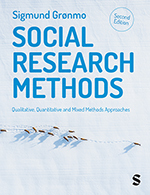
Social Research Methods
Qualitative, Quantitative and Mixed Methods Approaches
-
20% KEDVEZMÉNY?
- A kedvezmény csak az 'Értesítés a kedvenc témákról' hírlevelünk címzettjeinek rendeléseire érvényes.
- Kiadói listaár GBP 40.99
-
19 582 Ft (18 650 Ft + 5% áfa)
Az ár azért becsült, mert a rendelés pillanatában nem lehet pontosan tudni, hogy a beérkezéskor milyen lesz a forint árfolyama az adott termék eredeti devizájához képest. Ha a forint romlana, kissé többet, ha javulna, kissé kevesebbet kell majd fizetnie.
- Kedvezmény(ek) 20% (cc. 3 916 Ft off)
- Kedvezményes ár 15 666 Ft (14 920 Ft + 5% áfa)
Iratkozzon fel most és részesüljön kedvezőbb árainkból!
Feliratkozom
19 582 Ft

Beszerezhetőség
Megrendelésre a kiadó utánnyomja a könyvet. Rendelhető, de a szokásosnál kicsit lassabban érkezik meg.
Why don't you give exact delivery time?
A beszerzés időigényét az eddigi tapasztalatokra alapozva adjuk meg. Azért becsült, mert a terméket külföldről hozzuk be, így a kiadó kiszolgálásának pillanatnyi gyorsaságától is függ. A megadottnál gyorsabb és lassabb szállítás is elképzelhető, de mindent megteszünk, hogy Ön a lehető leghamarabb jusson hozzá a termékhez.
A termék adatai:
- Kiadás sorszáma Second Edition
- Kiadó SAGE Publications Ltd
- Megjelenés dátuma 2023. november 14.
- ISBN 9781529616811
- Kötéstípus Puhakötés
- Terjedelem656 oldal
- Méret 245x189 mm
- Nyelv angol 582
Kategóriák
Rövid leírás:
Whether students are working with qualitative, quantitative, or mixed methods approaches, this book demonstrates how good research is about asking and answering good questions—and guides readers new to methods in how to understand, structure, and successfully explore those questions.
TöbbHosszú leírás:
Framing research as the process of asking and answering questions, this book demonstrates how to identify good research questions and how to structure and explore them successfully.
Whether you are just beginning your research journey or are a seasoned traveller, it helps you:
• Decide what you want to achieve with your research
• Know what options you have to explore your goals
• Navigate the nuances of different research approaches
• Understand the decisions of other researchers
• Choose what path best suits your project.
Through real-life examples demonstrating different types of research, the book introduces qualitative, quantitative, and mixed methods approaches so you can compare different methods at every stage of the research process, from initial idea and design to data collection and analysis.
This new edition includes new chapters on collecting and analysing mixed methods data, and additional content on qualitative data analysis. New examples reflect the cultural and global diversity of social research, and extra visual aids and summaries support understanding of key research concepts and stages.
The book is accompanied by an online teaching guide, including videos, additional case studies, annotated articles, and critical thinking exercises.
"This is a must-have. Sigmund Grønmo's book provides a comprehensive and accessible introduction to contemporary social research approaches, designs and methods. This second edition includes timely and valuable new materials; particularly those on comparisons and combinations when collecting and analysing data. Like the first edition, this one will go straight to my reference bookshelf ... and onto all my major course reading lists."
TöbbTartalomjegyzék:
Part I Researching Society
Chapter 1 How and why we study society
Chapter 2 Methods and methodologies in social science
Chapter 3 The ethics and politics of research
Part II Designing Social Research
Chapter 4 Creating research questions
Chapter 5 Doing a literature review
Chapter 6 Choosing a research design
Chapter 7 Finding sources and data
Chapter 8 Sampling
Part III Data Collection and Data Quality
Chapter 9 Ethnography and participant observation
Chapter 10 Structured observation
Chapter 11 Unstructured interviews and focus groups
Chapter 12 Questionnaires and surveys
Chapter 13 Documentary sources and qualitative content analysis
Chapter 14 Quantitative content analysis
Chapter 15 Collecting qualitative and quantitative data: Comparisons and combinations
Chapter 16 Data quality, reliability and validity
Part IV Data Analysis
Chapter 17 Qualitative data analysis: Coding, categorization and concept development
Chapter 18 Qualitative data analysis: Typologies, hypotheses and holistic understanding
Chapter 19 Quantitative data analysis: Indexes and distributions
Chapter 20 Quantitative data analysis: Relationships between variables
Chapter 21 Generalizing empirical findings
Chapter 22 Analyzing qualitative and quantitative data: Comparisons and combinations
Part V Asking and Answering Questions in Social Science
Chapter 23 Description, explanation and understanding
Chapter 24 Time, space and level
Chapter 25 Relations, networks and structures
Chapter 26 Big data and computational social science
Part VI Writing and Presenting Research
Chapter 27 Working with data visualization
Chapter 28 Writing about research




